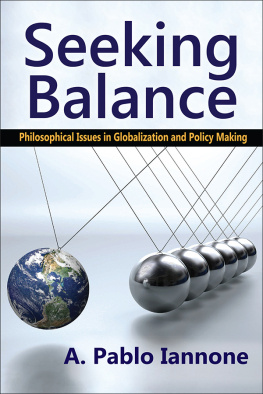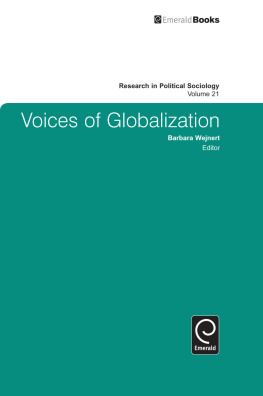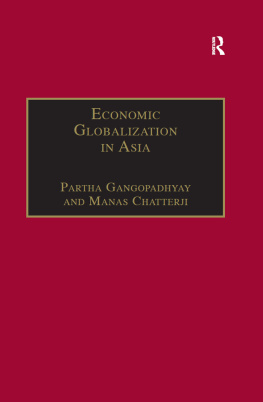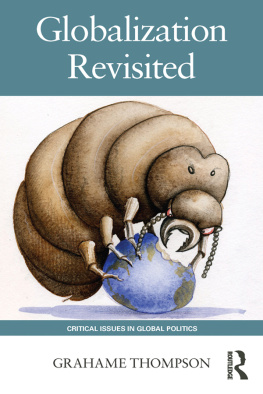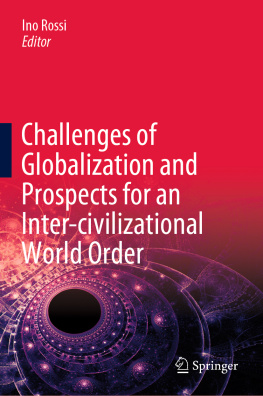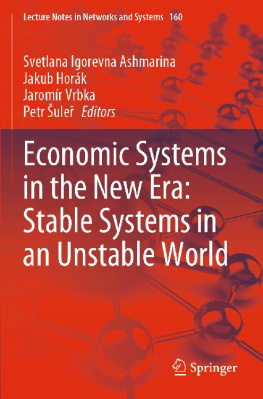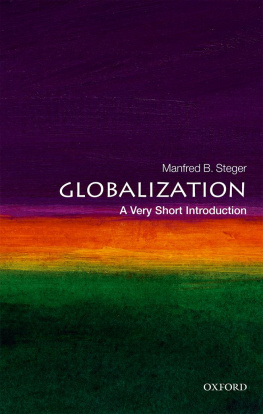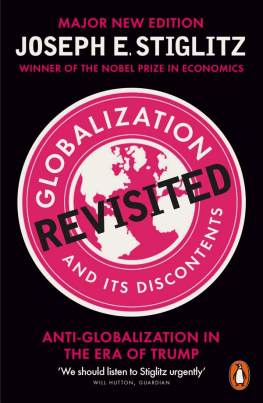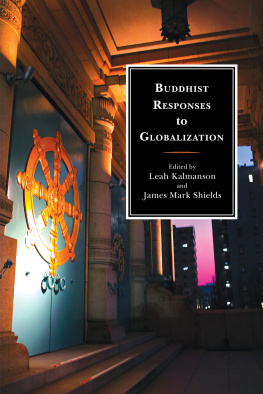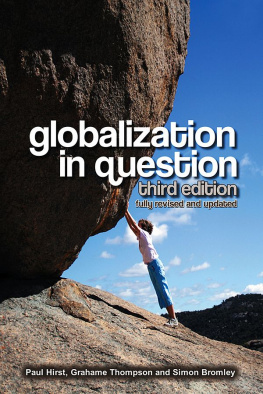First published 2014 by Transaction Publishers
Published 2017 by Routledge
2 Park Square, Milton Park, Abingdon, Oxon OX14 4RN
711 Third Avenue, New York, NY 10017, USA
Routledge is an imprint of the Taylor & Francis Group, an informa business
Copyright 2014 Taylor & Francis.
All rights reserved. No part of this book may be reprinted or reproduced or utilised in any form or by any electronic, mechanical, or other means, now known or hereafter invented, including photocopying and recording, or in any information storage or retrieval system, without permission in writing from the publishers.
Notice:
Product or corporate names may be trademarks or registered trademarks, and are used only for identification and explanation without intent to infringe.
Library of Congress Catalog Number: 2013037535
Library of Congress Cataloging-in-Publication Data
Iannone, A. Pablo.
Seeking balance : philosophical issues in globalization and policy making / A. Pablo Iannone.
pages cm
Includes bibliographical references and index.
ISBN 978-1-4128-5395-8 (cloth : alk. paper) 1. Globalization--Philosophy. 2. Policy sciences--Philosophy. I. Title.
JZ1318.I24 2014
320.6--dc23
2013037535
ISBN 13: 978-1-4128-5395-8 (hbk)
To the members of the informal philosophy seminar closest to my heart: my wife Mary Kay Garrow and our daughters Alejandra Emilia Iannone and Catalina Patricia Iannone.
Today, many things indicate that we are going through a transitional period, when it seems that something is on the way out and something else is painfully being born. It is as if something were crumbling, decaying, and exhausting itself, while something else, still indistinct, were arising from the rubble.
Vaclav Havel
This book is motivated by the need to address the recalcitrant problems and issues arising from globalization processes and the inadequacy of traditionally narrowfor example, merely economic or merely politicalways of conceiving of the conflicts and responding to them. This book, in contrast, conceives of globalization processes as not uniform and not merely economic and political but also technological, scientific, and cultural. Its purpose is to investigate their social and personal consequences and to formulate and, to the extent a book permits, apply a comprehensive approach to dealing with them.
This book builds on work carried out in my previous writings, especially Contemporary Moral Controversies in Technology (Oxford, 1987), Contemporary Moral Controversies in Business (Oxford, 1989), Philosophy as Diplomacy (Humanities Press/Humanity Books, 1994), and Philosophical Ecologies (Humanity Books, 1999). It further develops a pluralistic theoretical framework outlined in these previous philosophy books and applies it to philosophical problems and issuesespecially problems and issues in ethics and sociopolitical philosophyassociated with globalization. In a nutshell, the theoretical framework developed in this book involves a taxonomy of policy-making situations and two associated working hypotheses, the Range Hypothesis and the Balance Hypothesis, whose function is to guide policy making depending on the type of policy-making situation being faced.
In developing this framework, the inquiry the book undertakes is philosophical, not scientific, but it is carried out with an awareness of and in dialogueeven consonancewith current developments in the sciences. This inquiry has a dual purpose. First, it seeks to clarify and characterize the concept of globalization, classify the kinds of globalization processes prominently but not exclusively by the degree and scope of centralization they involve, and identify a variety of significant contemporary philosophical problems and issues in which globalization thus characterized plays a role. Second, the books inquiry seeks to provide philosophical policy-making guidance in the form of procedures for addressing these problems and issues.
Yet, any attempt to distinguish sharply between these two purposes, so that one of them purely constitutes philosophical description and analysis and the other purely constitutes a matter of evaluation and application or implementation, is too artificial, at least in that it oversimplifies the inquiry. Instead, the book is written with the recognition that these purposes mutually interact and affect each other. For example, description and analysis are significantly intertwined with evaluation and application or implementation through the testing and, if needed, reformulation of the analysis in accordance with theory-assessment criteria that are widely used in philosophy and that the book lists and employs. Prominent among these, and prominently used in the book, are consistency, clarity, comprehensiveness, explanatory power, predictive power, degree of embeddedness of conflicting explanations and their respective ontological commitments in common sense, and relevance to the problems and issues prompting the analysis.
At the same time, to say that the purposes are intertwined is not to say that it is impossible to emphasize one of them rather than the other at different points in the book. Nor is it to say that both purposes cannot ever be concomitantly pursued. Accordingly, some of the books chaptersfor example, , and 13are primarily theoretical, emphasizing description, analysis, and theory evaluation, while others have a significantly practical focus, emphasizing policy evaluation and application or implementation, though still combined, to a greater or lesser degree, with theoretical discussions.
As for research methods, Seeking Balance, like its predecessors, uses primarily two. One, taxonomic, is used both in philosophy and social process studies. It consists in merging description and argument. That is, it describes a number of cases or observationsfrom science sources and everyday lifeto exemplify categories, classifications, and theories, and then it uses the same and, for generalization purposes, similar cases or observations as evidence for the utility or accuracy of the categories, classifications, and theories. In social science, for example, Lewis Anthony Dexter described and used it to study contravention and conflict in administrative entities in his Intra-Agency Politics: Conflict and Contravention in Administrative Entities, Journal of Theoretical Politics 2 (1990), pp. 151172. This method is also used in philosophy among philosophers who attempt to connect conceptual analysis or phenomenological studies with the results of scientific research, the experiences of the general public, and the aims of ethics and sociopolitical philosophy. An example of this is David Braybrooke, Meeting Needs (Princeton University Press, 1987). I have used this method in my previous books.
The other method was introduced by Edith Cobb in her book entitled The Ecology of Imagination in Childhood (Columbia University Press, 1977). It is based on the ecological or systemsthough not holisticmodel of interchanges and mutual adaptations and interconnections between organisms and their environment. She used it to analyze childrens development of cosmic sense. As my Philosophical Ecologies made plain and as reiterates and further explains, this method can be understood in terms of feedback systems and also aids in understanding the adaptations developed by individuals and groups concerning matters that range from their interactions with their natural environments, through the place and role of ideology in dealing with the contemporary world, to the interactions and mutual adaptations between capital owners, employees, and consumers in the world of business and between these groups of people and policy-making constituencies in society. Together with the taxonomic method previously described, this second feedback system method serves to give unity to the book.

